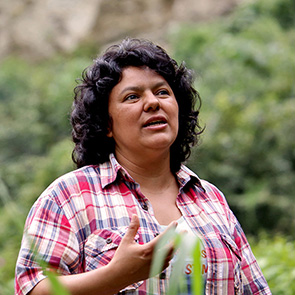
Berta Cáceres
"The fact that these outstanding women and men have to fight for their survival is not only a motivation to us all to do more on their behalf but is also a reproach to the callous indifference of so many governments” said Mary Lawlor, Executive Director of Front Line Defenders
"What haven’t stopped are death threats to Cáceres. Her murder would not surprise her colleagues, who keep a eulogy—but hope to never have to use it. Despite these risks, she maintains a public presence in order to continue her work. In a country with some of the highest murder rates in the world, Cáceres hopes the victory in Agua Zarca will bring hope to activists fighting irresponsible development in Honduras and throughout Latin America".
On 3 March 2016, unidentified assailants broke into the home of world-renowned indigenous rights campaigner Berta Cáceres and murdered her. Front Line Defenders condemns in the strongest terms the killing of human rights defender Berta Cáceres, and urges the Honduran authorities to conduct a thorough investigation into her killing, and to protect human rights defenders who peacefully and legitimately defend the rights of their communities.
I believe that through all of this we have learned to fight with joy, even though it gets very hard and painful. We must know that we don't have a backup planet, we only have one.
Berta Cáceres was a Lenca indigenous woman who, for the past 20 years, has been defending the territory and rights of the Lenca people. In 1993 she co-founded Consejo Cívico de Organizaciones Indígenas Populares – COPINH (Civic Council of Popular Indigenous Organisations), which led fierce campaigns against megaprojects. She faced off – and often won – against illegal loggers, plantation owners, multinational corporations, and dam projects that would cut off food and water supplies to indigenous communities. As a response to her battle for the rights of her people and other indigenous groups in Honduras, she received threats of death, rape, and physical attack. She faced charges of “illegal possession of a firearm endangering the security of the Honduran state,” usurpation of land, coercion, and causing more than $3 million in damages to DESA, a hydroelectric dam company. On 3 March 2016, she was murdered by as yet unknown assailants who broke into her home in the city of La Esperanza in the early hours of the morning.


